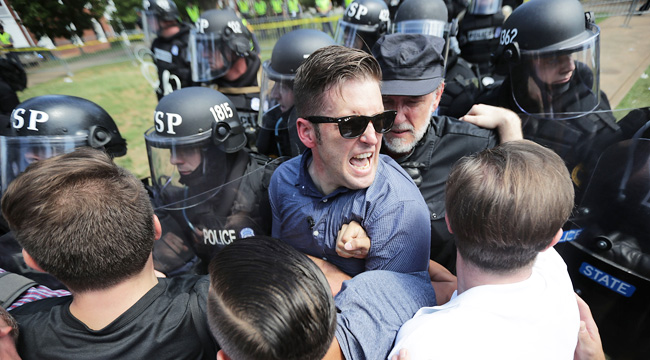
The University of Florida didn’t ask Richard Spencer to deliver a speech on campus, but they’ve been left holding the tab for the additional security needed when the white nationalist and his supporters roll into town. And given what happened when Spencer and his Nazi followers rallied in Charlottesville, security is the first thing on the minds of both university and state leaders. In fact, Florida Governor Rick Scott declared a state of emergency ahead of Spencer’s speech, a move Spencer finds as complimentary as some students and university administers find concerning.
“It’s flattering, I guess,” Spencer said to the Tampa Bay Times about the state of emergency. “I am in the same genre as hurricanes and invading armies.”
The Florida Division of Emergency Management, fresh off handling Hurricane Irma cleanup, is now in charge of martialing Gainesville police and having the national guard on standby. U of F president W. Kent Fuchs is hoping that these precautions will be unnecessary. “I really believe that the protests are the oxygen on which the white nationalists and white supremacists survive,” Fuchs said. “I want the protesters to not give them what they seek. We need to speak up on our own platform, not [Spencer’s].”
Meanwhile, he’s trying to find room in the university’s budget for the $600,000 security costs Spencer’s visit is estimated to necessitate. All this, because Spencer decided to spend $10,564 to rent an on-campus auditorium after picking the university for its well-known brand and sizeable body of white students. Despite the immediate backlash, Fuchs’ hands are tied. He can’t refuse Spencer the event space because the University of Florida is a public university and bound by laws concerning freedom of expression.
Nor can Fuchs charge Spencer for what the university spends on security, thanks to the 1992 ruling in Forsyth County v. Nationalist Movement — a case that also concerned a town having to put up with an appearance by white nationalists. Essentially, charging more than a “nominal” permit fee for gatherings in public spaces can be interpreted as a limitation on the first amendment. So, the University of Florida waits for Thursday afternoon with bated breath, wondering if this is going to be a repeat of the violence in Charlottesville or an expensive flash just south of the panhandle.
(Via Washington Post & NPR)
